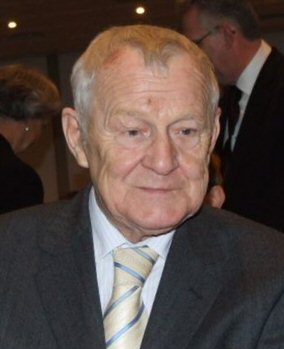Mieczysław Rakowski facts for kids
Quick facts for kids
Mieczysław Rakowski
|
|
|---|---|

Rakowski in 2007
|
|
| 7th First Secretary of the Polish United Workers' Party | |
| In office 29 July 1989 – 29 January 1990 |
|
| President | Wojciech Jaruzelski |
| Prime Minister | Czesław Kiszczak Tadeusz Mazowiecki |
| Preceded by | Wojciech Jaruzelski |
| Succeeded by | Party dissolved Aleksander Kwaśniewski (As Leader of Social Democracy) |
| 9th Prime Minister of Polish People's Republic | |
| In office 27 September 1988 – 2 August 1989 |
|
| President | Wojciech Jaruzelski |
| Chairman | Wojciech Jaruzelski (Until Jul 1989) |
| Preceded by | Zbigniew Messner |
| Succeeded by | Czesław Kiszczak |
| Deputy Prime Minister | |
| In office 12 February 1981 – 12 November 1985 |
|
| President | Henryk Jabłoński |
| Personal details | |
| Born | 1 December 1926 Kowalewko, Poznań Voivodeship, Poland |
| Died | 8 November 2008 (aged 81) Warsaw, Poland |
| Political party | Polish United Workers' Party |
| Spouse | Elżbieta Kępińska |
| Occupation | Historian, Journalist |
Mieczysław Franciszek Rakowski (born December 1, 1926 – died November 8, 2008) was an important Polish politician. He was also a historian and a journalist. He served as the Prime Minister of Poland from 1988 to 1989. He was also the last leader of the Polish United Workers' Party from 1989 to 1990.
Contents
Early Life and Political Beginnings
Mieczysław Rakowski was born into a farming family. As a teenager, he worked with machines, operating a lathe. He joined the Polish People's Army and served as an officer from 1945 to 1949.
His political journey began in 1946 when he joined the Polish Workers' Party. From 1948 until 1990, he was a member of the communist Polish United Workers' Party (PZPR). He was part of its main committee, called the Central Committee, from 1975 to 1990.
In 1956, he earned a special degree in history from the Institute for Social Sciences in Warsaw.
Leading Poland Through Change
Rakowski became the Prime Minister of Poland in September 1988. He held this important role until August 1989. He was the second-to-last communist Prime Minister. After him, Czesław Kiszczak served for less than a month. Then, Tadeusz Mazowiecki became the first non-communist Prime Minister.
From July 1989 to January 1990, Rakowski was also the last First Secretary of the PZPR. However, by this time, the PZPR had already given up its full control over the country. This meant Rakowski was not the main leader of Poland, unlike earlier First Secretaries.
A Journalist and Editor
Beyond politics, Rakowski was well-known as a journalist. He helped start the weekly newspaper Polityka in 1958. He was its first deputy editor and later its chief editor until 1982. Polityka was a very important publication in Poland at that time. It is still published today and is seen as a respected weekly newspaper. Many people remember Rakowski more for his work as a journalist and editor than as a politician.
Role in Polish Transformation
Rakowski was part of the communist government during a time of big changes in Poland. He was involved when the government tried to control the Solidarity movement.
He also played a key role in Poland's shift from a state-controlled economy to a market economy. His government had to make reforms. He was one of the main people involved in the Polish Round Table Agreements. These agreements led to peaceful changes and the end of communist rule in Poland.
Personal Life and Legacy
Before becoming Prime Minister, Mieczysław Rakowski was married to the famous violinist Wanda Wiłkomirska. They had two sons together.
Mieczysław Rakowski passed away on November 8, 2008, in Warsaw at the age of 81. He was buried at the Powązki Military Cemetery in Warsaw.
See also
 In Spanish: Mieczysław Rakowski para niños
In Spanish: Mieczysław Rakowski para niños
 | Selma Burke |
 | Pauline Powell Burns |
 | Frederick J. Brown |
 | Robert Blackburn |

